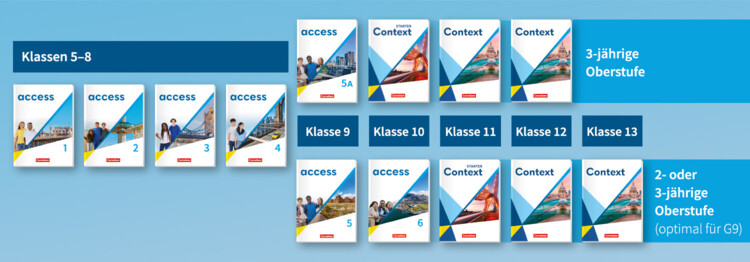
Neu: Schulbücher für Klasse 9 entdecken
Band 5: 9. Schuljahr, Schulbuch
Band 5: Abschluss: 9. Schuljahr, Schulbuch
Band 4: 8. Schuljahr, Schulbuch
Band 4: 8. Schuljahr, Workbook
Band 3: 7. Schuljahr, Schulbuch
Band 3: 7. Schuljahr, Workbook
Band 2: 6. Schuljahr, Schulbuch
Band 1: 5. Schuljahr, Schulbuch
Band 1: 5. Schuljahr, Workbook
Wie unterscheiden sich die Schulbücher für Klasse 9 und 10?
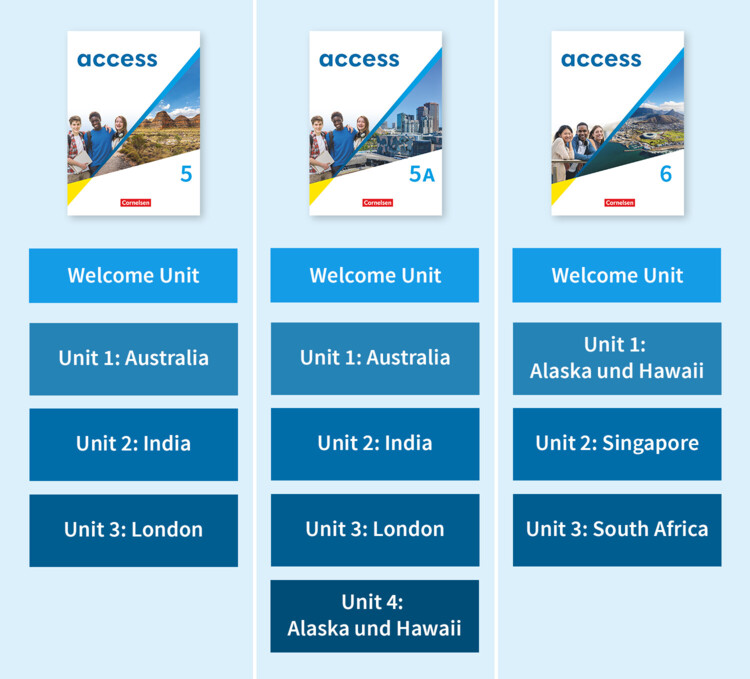
Übersicht G8/G9: Mit Access und Context bis zum Abitur

Generation Hybrid – einfach erklärt!
Kostenfreies Materialpaket zu Schulbuch und Workbook
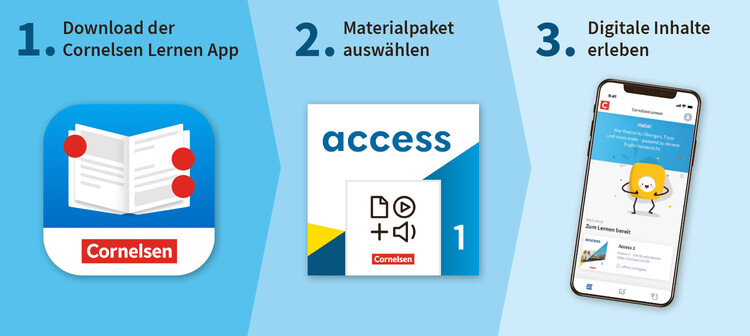
Das neue Hybridkonzept erleben, passend zur Seite im Schulbuch oder Arbeitsheft: Einfach die kostenlose Cornelsen Lernen App herunterladen – im App Store oder bei Google Play. Die App öffnen (wahlweise mit Registrierung oder NEU: ohne Registrierung) und in der App das hybride Materialpaket zu Access auswählen. Seitenzahl eingeben und optionale digitale Inhalte entdecken: Audios, Videos, Digital help, Digital quiz und Digital checkpoint.
Die Unitstruktur
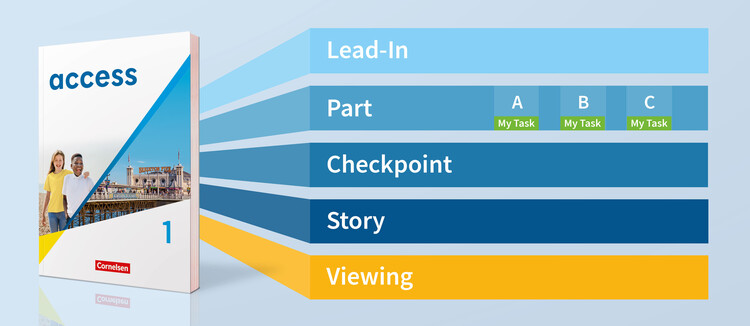
Lead-In
Der Auftakt zu jeder Unit
- Für alle Parts werden Lernziele formuliert; die Story wird angeteasert – das weckt Neugierde auf mehr!
Part A, B und C
Kompetenzorientierung:
- gezielter Kompetenzschwerpunkt in jedem Part – mit je einer Task („My Task“) am Ende
Die neue Part-Struktur im Detail:
- Kompetenztraining systematisch, linear und für Sie und Ihre Lernenden gleichermaßen verständlich
- Jeder Part führt in nachvollziehbarer Progression die Bereiche Sprechabsichten, Wortschatz, Grammatik, Kompetenzschulung und Anwendung in einer Task zusammen
Checkpoint
- Gezieltes Fördern des autonomen Lernens – mit Übungen, die durch individuelle Wiederholung Lernerfolge bestätigen und festigen
Story
- Jede Unit endet mit einem längeren, spannenden Lesetext
- Freude am Lesen steht im Mittelpunkt
Viewing
- Spaß und Spannung mit den neuen Dare Challenges geschrieben von David Fermer
- Einblicke in interkulturelle, kommunikative Situationen und den Handlungsort Brighton
Besonderheiten
Band 3
Unit 1
Unit 1: London

Pearl Cole: I’m from Notting Hill in North London. I really am a Londoner, through and through. My passion is theatre. I love acting, and I love trips to the theatre to watch plays. Every weekend, I take part in an acting workshop at the Globe Theatre. That’s a very famous theatre, right on the River Thames. We learn how to speak clearly and loudly, and how to show emotions when we act. It’s hard work, but it’s a lot of fun! I want to be a professional actor, so I take the workshops very seriously.
Ali Nasif: I’m fourteen years old and I’m from North London. London is the best city, right? The whole world is here. One minute, you’re on Edgware Road in „Little Beirut” with all the amazing Middle Eastern cafés and shops, the next minute you can be in Knightsbridge with all its expensive cars and posh restaurants. I’m really interested in food. I’ve actually started my own little podcast where I talk about the different food you can find in London. It’s a great way to get to know the city.
Unit 2
Unit 2: Manchester
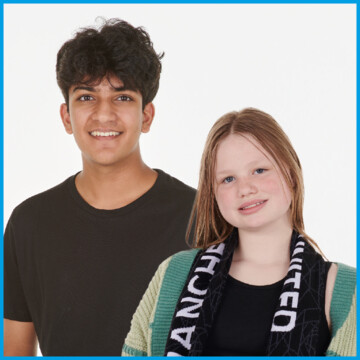
Omar Roy: I go to Traff ord High School with Rosie Moss, and we’re in the same class. I love football on TV, but I don’t play a lot of football. I play it at break time at school, but I don’t play it at the weekend or aft er school so much. In my free time I play a lot of computer games. I especially love games where you play with other people online. Some people have funny ideas about computer games … they think it’s not real life. I know that that’s what my mum and dad think. But I don’t agree. I make real friends when I play. Sometimes I don’t even know their names or what countries they’re from, but that doesn’t matter to me.
Rosie Moss: I’m a student at Traff ord High School in Manchester. I’m a Mancunian (that’s what you call someone from Manchester) and I love football. Big surprise, right? When you say you’re from Manchester, everyone always thinks of football. I play in a powerchair football team called the Oldham Juniors. Maybe you’ve heard of us? We’re top of our league.
Unit 3
Unit 3: Schottland
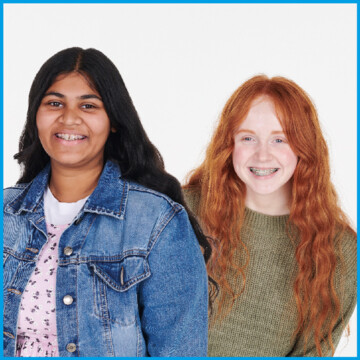
Diya Hadid: “Only boring people get bored.” That’s my motto. My life is very full and busy, and that’s how I like it. I play hockey after school on Mondays, I do IT club on Wednesdays and on Thursdays I volunteer with our school recycling club. At the moment, I’m organizing a big “clothes swap” event for teens in Edinburgh. You can bring your old clothes and swap them with other people. It’s going to be a fun event, and good for the environment, too!
Iona Grey: Edinburgh, my hometown, is such a great city. But I think I’m happiest when I’m in Orkney, where my grandma lives. It’s so beautiful and green there … the air smells so fresh. The people are very friendly, too. They always stop and say “hello” when you walk past them on the beach. Maybe I’ll move there one day.
Unit 4
Unit 4: Wales

Leo Rees: I’ve just moved from Aberystwyth in South Wales to Caernarfon, up in the North. It’s a big change. A lot of people in North Wales speak Welsh in their everyday lives. I can speak a bit of Welsh, but I’m not amazing at it. A lot of people know me as a great rugby player. I played on my old school team and we won a lot of matches. One thing that nobody knows about me is that I also write poetry. I don’t show it to anyone though. It’s important to keep some things secret, right?
Evan Evans: How do you do? My name’s Evan. Evan Evans. I know … some people fi nd my name a bit funny. My dad is called Evan, and it was my granddad’s name, too. There’s a long line of Evan Evanses in my family! I live in Caernarfon. That’s a small town in North Wales. About 10,000 people live here. I don’t know them all, but I know a lot of them. When you live in a small town like Caernarfon, you see the same people again and again. I’d like to live in a big city one day … somewhere like Cardiff , the capital of Wales, or maybe even London. I can’t imagine what it would be like to live in a city where nobody knows who you are!
EXTRA
EXTRA: Nordirland & Irland
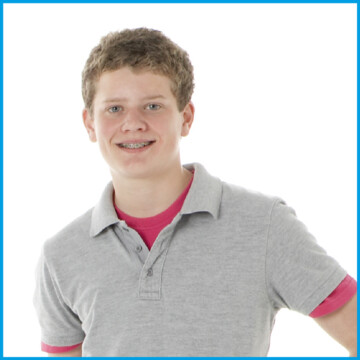
Luke Harvey: I live in Londonderry – or just Derry – in Northern Ireland. People from other parts of the UK oft en ask why our city has two names: Londonderry and Derry. Well, it’s mostly about your religious background. Protestants like me usually say Londonderry. Catholics prefer Derry. Actually, Protestants and Catholics here see a lot of things diff erently, and we don’t mix much either. But that’s changing a bit now. For example, my school orchestra and the orchestra from a Catholic school are going to give a concert together. I’ve got to know Niamh, a girl from the Catholic school. We both play the trumpet and have a lot of fun at rehearsals. Maybe we’ll become friends.
Videomaterial Band 3
im kostenfreien Materialpaket
Besonderheiten
Band 1 und 2
Fünf Brighton-Kids und ihre Abenteuer
Alice Shaw
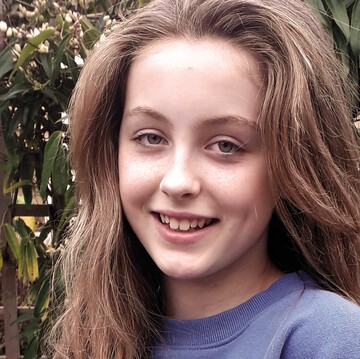
Alice lebt im Brightoner Stadtteil Patcham mit ihrem alleinerziehenden Vater Tim und älterem Bruder Jake. Mit Jake hat sie ein gutes Verhältnis, auch wenn es manchmal knirscht – sie spielen Fußball zusammen im Garten, streiten aber ab und zu über das Familien-Tablet. Alice freut sich auf die neue Schule, auch deshalb, weil ihr bester Freund aus der Grundschule, Zane Adebayo, dabei sein wird. Durch ein unerwartetes Ereignis wird Alice zur Schlüsselfigur der Geschichte.
Zane Adebayo
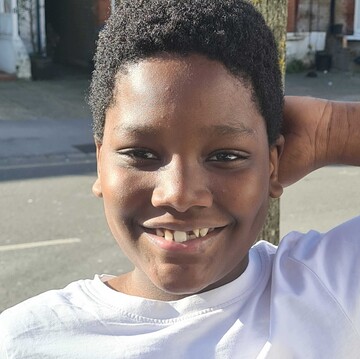
Genau wie Alice wohnt Zane im Stadtteil Patcham. Durch seine selbstbewusste und charmante Persönlichkeit wird er an der neuen Schule schnell zu einem der beliebtesten Kids. Er ist aufgeschlossen und schließt schnell Freundschaft en mit den unterschiedlichsten Charakteren. Zane verteidigt seine Freunde und setzt sich immer für Fairness ein. Sein Vater betreibt ein Café im Stadtzentrum von Brighton, wo Zane sich manchmal mit seinem engeren Freundeskreis trifft .
Noah Williams
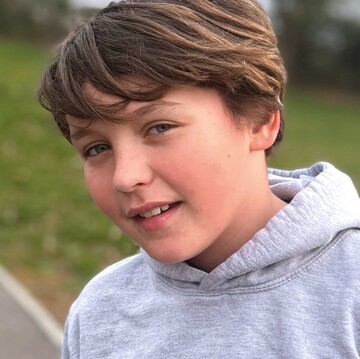
Ganz anders als Zane ist Noah eher schüchtern und unbeholfen. Das Leben in der neuen Schule ist für ihn nicht immer einfach. Er ist ein nachdenklicher Junge, der gerne und oft allein ist. Morgens joggt er im Park mit seinem geliebten Hund Buddy und spielt Gitarre. Noah ist Einzelkind; seine Eltern sind eher altmodisch und etwas streng. Anfangs wird er von den anderen Schülern nicht ganz akzeptiert – aber das wird sich bald ändern.
Lily Hall
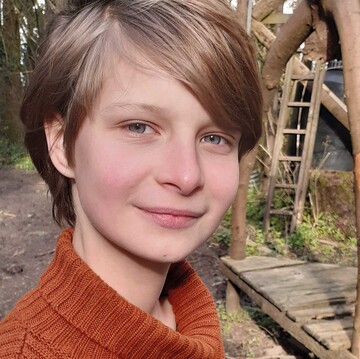
Lily ist eine eigenwillige Persönlichkeit, die sich nicht unbedingt anpassen will und immer unverblümt ihre Meinung sagt, auch bei heiklen Themen. In der neuen Schule werden sie und Alice schnell beste Freundinnen, wobei das Verhältnis nicht immer einfach ist. Lily spricht manchmal zu Hause Russisch mit ihrer Mutter, die aus Moskau stammt. Ihre Familie wohnt im Whitehawk Estate, eines der ärmeren Stadtviertel Brightons.
Sunita Chandra
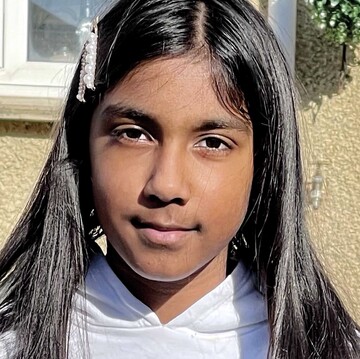
Computer-Whizz-Kid Sunita ist immer gut gelaunt. Sie steht nicht gerne im Mittelpunkt, freut sich aber, wenn sie ihren Klassenkameraden helfen kann. Anders als die meisten Schüler an der Schule wohnt sie nicht in Patcham, sondern stammt aus dem bürgerlichen Stadtteil Hove.
Das Maskottchen Scout
Scout, das freche Möwen-Mädchen
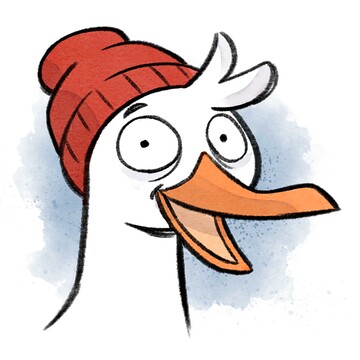
Gestatten: Scout! Gierig, frech und clever wie aus dem Bilderbuch ist dieses Exemplar einer Brighton-Möwe! Nur, dass sich Scout in unser Lehrwerk „eingenistet“ hat. Als Maskottchen treibt Scout dort viel Unsinn, macht sich aber auch sehr nützlich: So befl ügelt sie Ihre Schülerinnen und Schüler im Unterricht und schafft eine emotionale Bindung beim Lernen.
Der Handlungsort Brighton
Mehr als Meer!
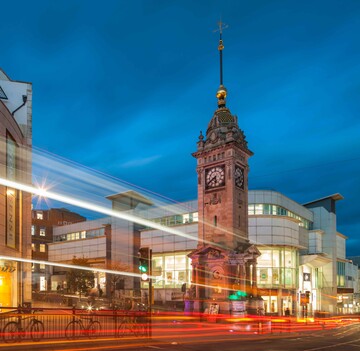
Folgen Sie uns in die lebhafte Küstenstadt Brighton mit rund einer Viertelmillion Einwohner/-innen – und mehr als 9 Millionen Besucher/-innen aus aller Welt jährlich! Idyllisch am Meer gelegen, kann man hier nicht nur herrlich baden – sondern noch viel, viel besser das Leben feiern und eine unvergessliche Zeit haben!
Kaum ein Ort zieht junge Menschen so magisch an wie Brighton – nicht etwa mit seiner wohltuenden Seeluft, sondern vielmehr mit einer ganz außergewöhnlichen, lebendigen Atmosphäre. Dafür verantwortlich: ein einmaliger Mix an Menschen, der sich hier zusammenfindet – und wiederum neue Besucherscharen aus England und der ganzen Welt anzieht. Sie alle finden hier genau das, was sie suchen: sei es die vielfältige Kultur, die bunte Künstlerszene, die kilometerlange Strandpromenade – oder aber auch einfach nur exzellente Studiermöglichkeiten.
Und auch Sie und Ihre Schülerinnen und Schüler finden hier genau das, was Sie suchen: einen spannenden, vor prallem englischen Leben berstenden, neuen Handlungsort, der das Erlernen der englischen Sprache zum puren Vergnügen macht!












